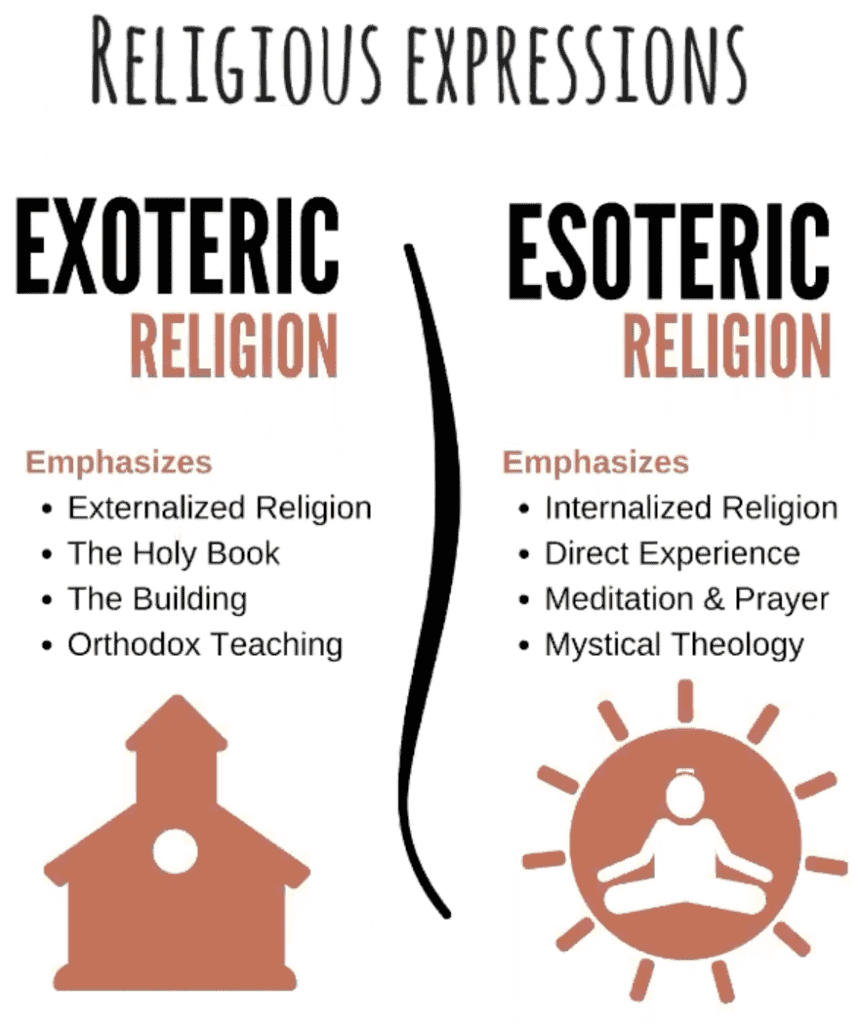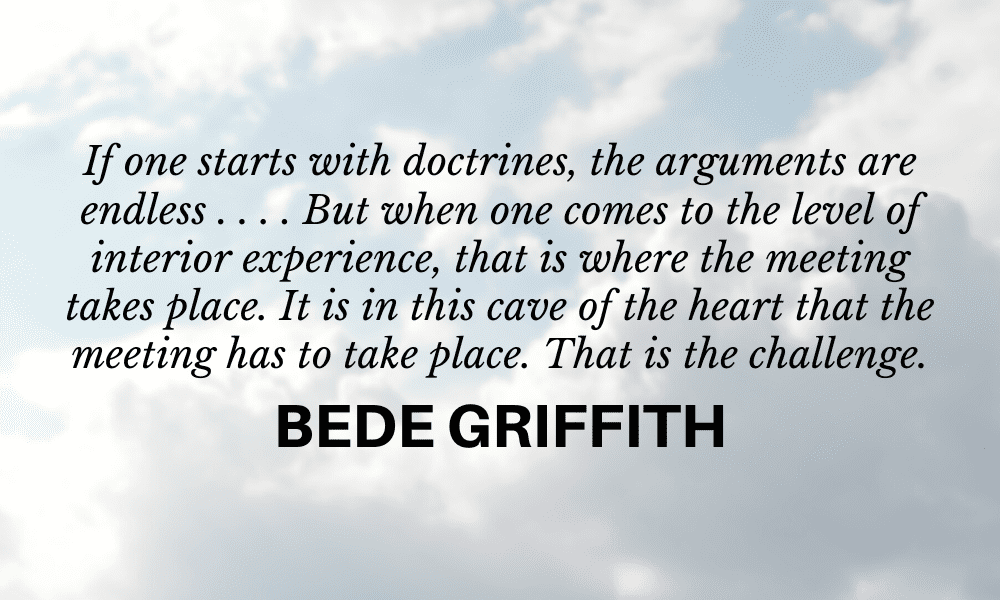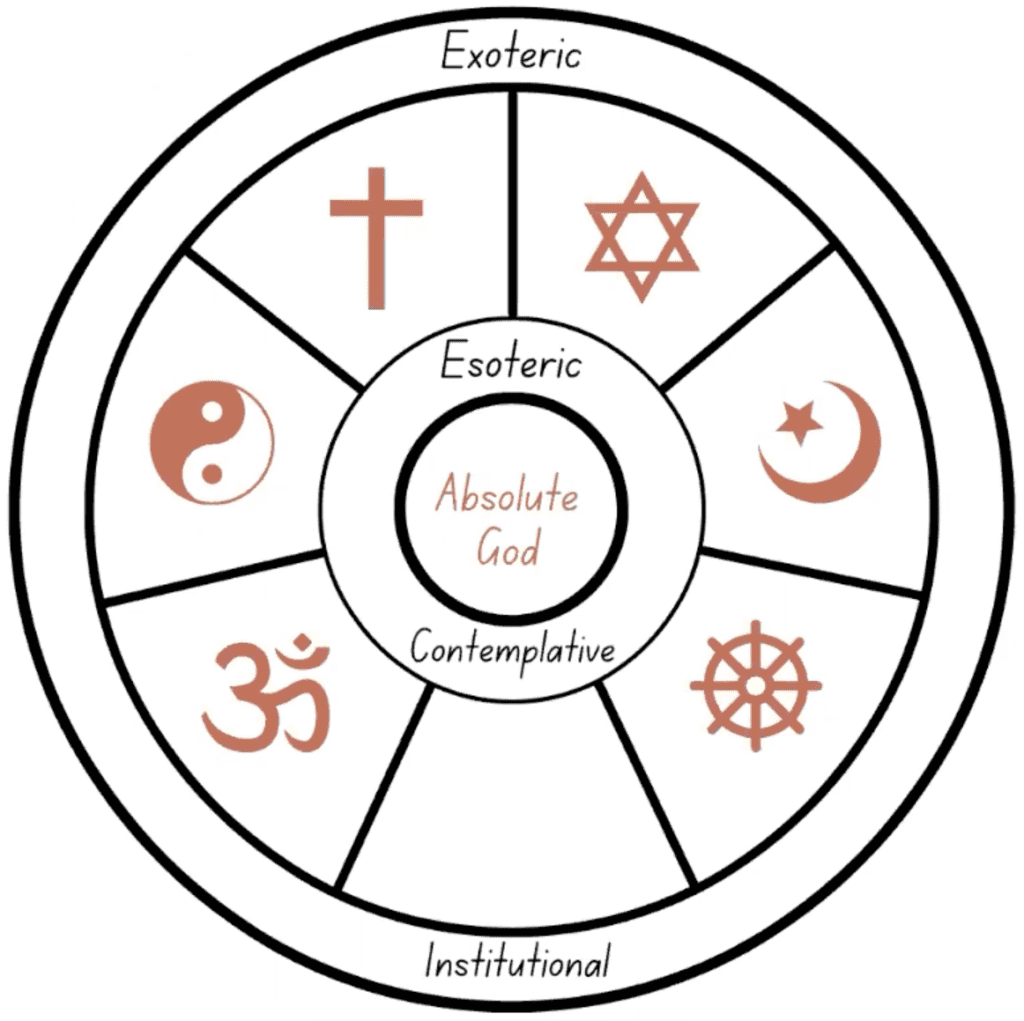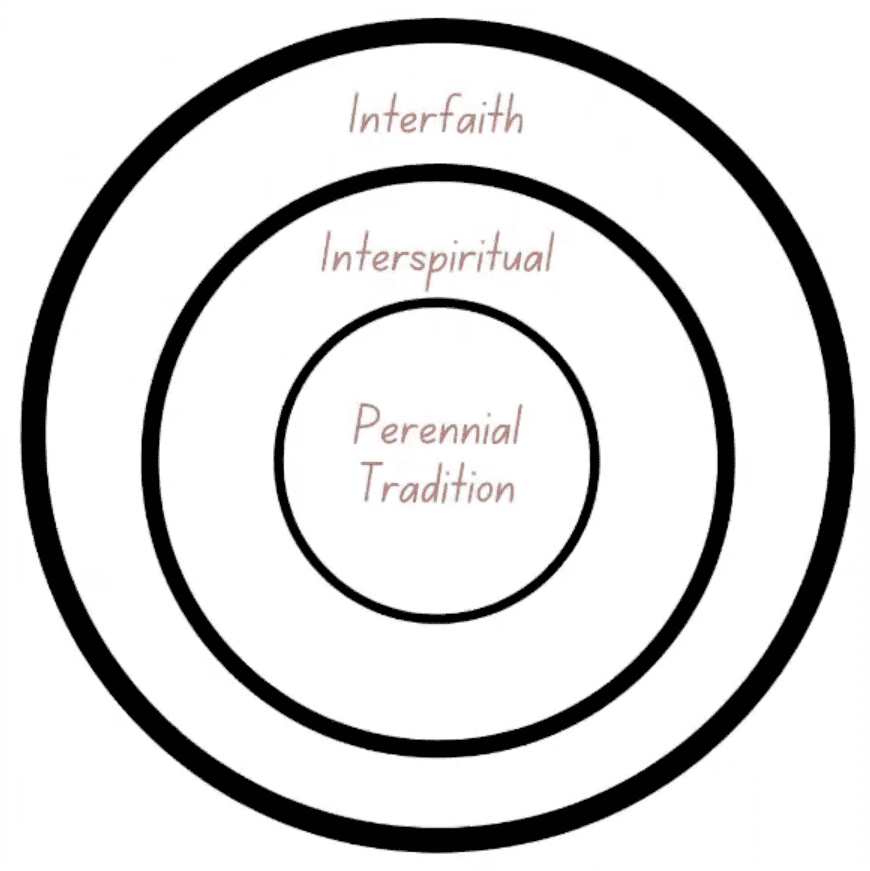Perennial Philosophy 101
Perennial Philosophy is a school of thought affirming the good, the true, and the beautiful in all religious traditions based on the belief that all religions emanate from the same Source.
You can imagine a single spring feeding many unique bodies of water. Each of the religions is a way of bringing fresh Water to the thirsty. God is the universal water, how it gets into the people is the work of religion.
What is Perennial Philosophy?
Perennial Philosophy affirms that each religious tradition, in its healthiest and most mature expression, is a genuine expression of and invitation into, what is Absolute and most Ultimate, namely, God.

Often called “Traditionalism”, Perennial Philosophy affirms that the world’s major religious traditions: Buddhism, Hinduism, Taoism, Islam, Christianity, Judaism as well as the world native and indigenous religions, all share a common Origin and ultimate End.
According to Perennial Tradition, God is the universal source of religions.
God is Absolute Truth. God is timeless. God is eternal. And God cannot be boxed into any single religion. God is too large and too mysterious to be limited to just one religion.
Each religion is a flowering of the Absolute Wisdom of God. All religions are genuine and legitimate paths to and from God.
What follows is a brief overview of a very wide and nuanced philosophical system.
(If you are looking for a more in-depth look, watch out for my 3-part series on Perennial Tradition).

Exoteric and Esoteric Religious Expressions
Although the religions disagree when it comes to doctrine and dogma—what they believe—when we investigate the underlying principles of the religions, they share much in common. For instance, all religions share in the teaching “love thy neighbor.” They also teach of the inherent goodness of humanity.
To understand this further, it is helpful to break religion into two general categories: exoteric and esoteric.

Exoteric Religion is expressed in the externals of religion: the building, the sacred book, the religious rites and practices, and the overarching belief system.
Esoteric religion is expressed in a religion’s internal life: the direct experience of the practitioners, the experience of contemplative prayer or meditation.
Though the esoteric and exoteric weave in and out of each other, you will see a clear distinction emerge. However, I must emphasize that they are not opposed to each other!
To embody a holistic and mature faith practice requires us to integrate both the inner and outer expressions of faith.
Our Shared Contemplative Experience
But that is not all they have in common. What Perennial Philosophy points at is the shared experience of the contemplatives and mystics of the religions.
As we investigate the inner life of religious mystics across the various religions, very common experiences emerge.

Whether you are a Buddhist monk, a Christian mystic, or a Sufi Muslim, all mystics dive into the Ultimate Mystery and come back with similar language and experience. As the saying goes: “Theologians may quarrel, but the mystics of the world speak the same language.”
If you get two religious professionals from two different religions (representing exoteric religion), they will find plenty to argue about. But get two mystic’s – people of deep prayer and meditation – together (representing the esoteric), and there is much more in common!
People of contemplative prayer and meditation go to their inner Center and find God, the same God as those from another religion.

Perennial Tradition, Interspirituality, and Spiritual Practice
Perennial Tradition is what gives various committed religious practitioners the authority to engage with religious and spiritual practices of other religious traditions.
This is known as “interspirituality.”
Interspirituality is an evolution of the concept of interfaith. It is a way of meaningfully exploring the spiritual practices of a faith not your own.
“Interfaith” is concerned with the “meeting of religions” on the conceptual or social level.
“Interspirituality” is concerned with immersing oneself in the spiritual and contemplative practices of another faith. This means fully opening to how the divine will work in the practice and how it will be expressed within it.
Perennial Tradition in Our Faiths
Many Christians spend time at Buddhist Retreat Centers in committed Buddhist practice. There is no need to “identify” as Buddhist. All one needs to do is recognize the value of the spiritual practice and honor its roots.
In Perennial Philosophy, because Buddhism is seen as an authentic expression of the divine manifesting in the world, this does not hurt one’s “Christian” faith but enhances it.

Similarly, I’ve been at a Catholic Mass (I’m not even Catholic) where I’ve shared communion with a Buddhist monk. The fact that he was a committed Buddhist monk did not stop him from immersing in the deep Mystery accessible in the practice of Communion.
When we embrace the reality that God is larger than our single spiritual practice or religion, we can then open ourselves to the way God is showing up in the religious practices other than our own.
Why is Perennial Philosophy important?
Regardless of whether one wants to immerse oneself in the religious practices of an outside faith, it is not uncommon to find deep intimacy and shared values with religious practitioners across the great divide.
Regardless of the cup from where we drink, pure spring water remains as clean and as refreshing.
We all have a deep yearning for union and Perennial Philosophy is one way of viewing the inherent unity of all religions and all of humanity.


What a relief it is to stand down from being on guard, from ‘intruding between my neighbour and God’ (Rowan Williams), to be able to shut up and instead be fellow travellers on the journey.
Love this Duncan! Appreciate that quote from Rowan Williams. Why would we ever want to be a barrier between someone and God? Thank you.
[…] teacher friend Keith Kristich has a great explanation about perennial philosophy. A couple great books on this are the Mystic Heart by Wayne Teasdale, and Answering the […]
[…] teacher friend Keith Kristich has a great explanation about perennial philosophy. A couple great books on this are the Mystic Heart by Wayne Teasdale, and Answering the […]
[…] teacher friend Keith Kristich has a great explanation about perennial philosophy. A couple great books on this are the Mystic Heart by Wayne Teasdale, and Answering the […]
It’s great to have a name for what I have always sensed to be true. This affirmation feeds my spiritual growth. Thank you!
So glad it resonates, Timothy. Many of us are on to this way of thinking and experiencing. Good to connect with others of like-heart.
Does Bede’s last name end in “s,” not “h”?
The direct experience of the Source, whatever name is used for “That”, is consistently described…in as much as words can express such an experience. To suggest that what lies before, around and within everything can be exclusive to any belief system is inadequate…..anyone who has practiced contemplation and had such experiences in the moment will see this clearly. Thank you Keith.
Hi, The word ‘God’ or factor God does not play much in Buddhism. As I understand Buddha taught that a notion of God is not needed for enlightenment.
When the exoteric does not practice the esoteric and experience God for themselves, they are stuck arguing about concepts of God without experiencing God directly. Also the exoteric mixes a lot of culture into religion and largely the people don’t know how to differentiate what is culture and religion so that also factors in to divide people. Division, pride/ego, identification, and duality can never be the real expression of God, but only of the ego. Some religions more than others promote exclusivity, which results in people constantly feeling defensive about their loyalty to that religion- they have to make sure they appear to identify with the “correct” denomination in order to not be discounted/thrown out of the tribe. Such religious tribes that are constantly looking for a witch-hunt, are not spiritually mature. Any religion that stresses more practice of the esoteric such as meditation rather than identification results in a more spiritually mature populace that has experienced the peace of God and shares it with others without making so much noise.
I’ve been following Keith and Closer Than Breath on Social Media for at least a couple years and attended several retreat sessions and summits. This is my first time coming across this blog post which is such an excellent introduction and summary of inter-spirituality! I’m a new Spiritual Director coming from the Christian wisdom tradition, but as a deconstructed evangelical and reconstructing contemplative and mystic, my desire is to be an inter-faith/inter-spiritual director. Thank you for all you do for those on the spiritual journey!
Hi All,
I agree that it is possible to experience the ‘ground of God,’ but in my experience this is a partial, and therefore dangerous, half truth. In my view, many mystics encounter the Mind of God, the Cosmic Mind, or Cosmic Consciousness, as I did in 1996. However, they either miss or don’t understand there exists another level of consciousness above that, and which is the Personhood of God. Imagine an author who ‘creates’ characters is a story. The Cosmic Mind is that which contains these characters as well as the natural world, which was also created. However, the Personhood of God, enables the characters to engage with the created realm with the gift of freewill or context-setting, as I like to call it. This means the characters are interconnected with and part of Cosmic Consciousness but are creations of the Personal Godhead at the same time. This view conforms better with Christianity than Buddhism and other perennial philosophies like the Eastern religions and the indigenous religions which tend to worship the created rather than the creator and raise idols from the contents of the Cosmic Mind to worship. If this is the case, then the plan of redemption, as presented when the Old and New Testament are understood together, is the key to salvation and to eternal life, while the others are partial, verily, false doctrines and do not lead to salvation. I urge you all to take a good long look at your options.
Keith,
As always, your work and words inspire me to stay the course; here I find the support essential to build on my own earnestness and commitment, and with no small amount of gratitude and eagerness! From my heart.
Unity truth at last… religion has separated societies for too long.. God (in our wisdom) is healing all rifts…
Great Keith. Thanks for explaining this So clearly! You have a gift for this!